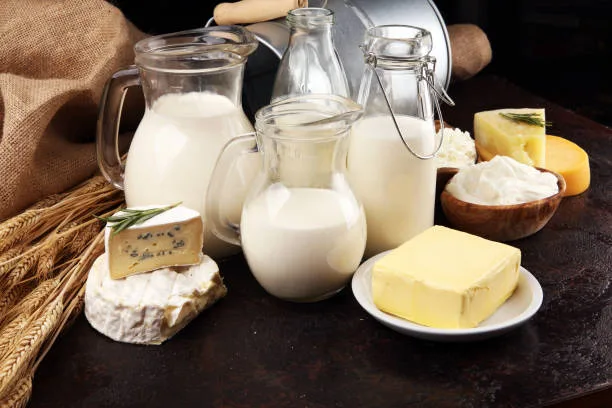Dairy is one of those foods that seems to confuse people trying to lose weight. Some diets tell you to eat more of it. Others say to avoid it. So what’s the real deal? Let’s break down what science actually says about dairy and weight loss.
I’ll walk through the evidence, myths and tips so you can decide if dairy should join you on your weight loss journey. Grab a glass of milk and let’s satisfy your curiosity!
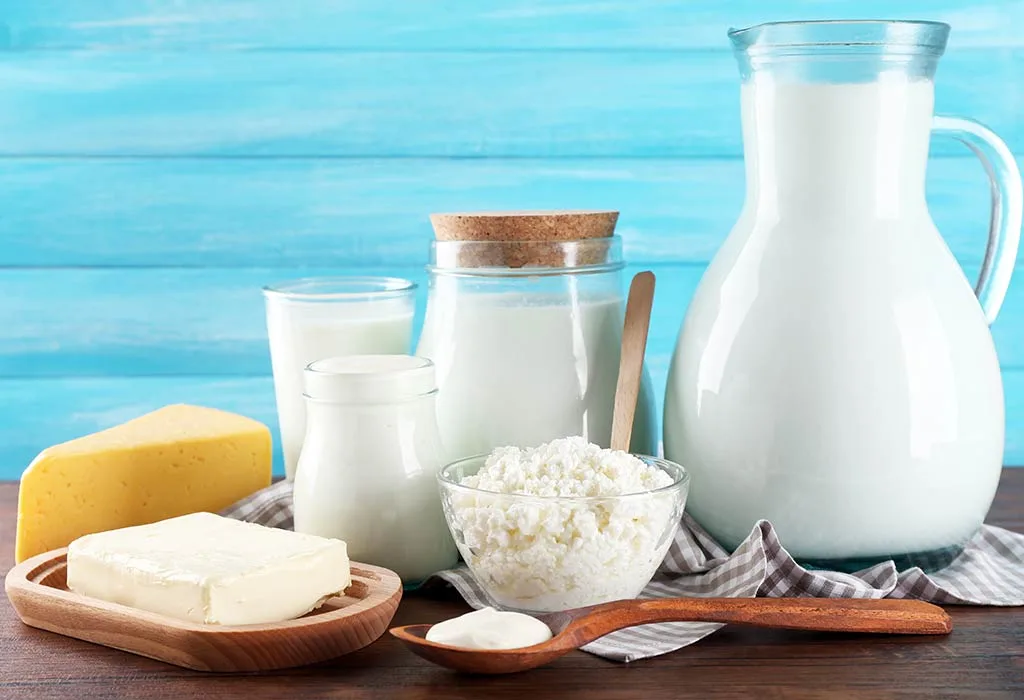
Dairy 101 – The Need-to-Know Basics
First things first – let’s cover the basics. What counts as dairy? Dairy foods come from the milk produced by cows, goats, sheep and other mammals. The most common dairy products are:
- Milk (whole, 2%, 1%, skim)
- Cheese (cheddar, mozzarella, cottage, you name it)
- Yogurt (Greek, regular, flavored, etc.)
- Butter
- Cream cheese
- Everyone’s weakness – ice cream!
Dairy contains some key nutrients, especially calcium for healthy bones and high-quality protein to curb hunger. It also provides vitamin D, vitamin A, vitamin B12, potassium and magnesium.
When eaten in moderation as part of a balanced diet, dairy can fit into an overall healthy way of eating. The nutrients work together with those found in other wholesome foods like fruits, veggies, whole grains and lean proteins.
For adults, nutrition experts recommend about 3 servings of low-fat or nonfat dairy per day. That’s equal to 1 cup of milk or yogurt, 1.5 ounces of real cheese (not the processed stuff), or 2 ounces of a cheese spread like cream cheese. Getting enough dairy – but not going overboard – provides benefits without too many calories or saturated fat.
Of course, everyone is different. If you’re lactose intolerant or have an allergy, dairy may not be your friend (more on that later). But for most of us, moderate dairy consumption can be part of a nutritious diet.
So with the basics covered, let’s tackle the big question: What does science actually say about eating dairy if you want to lose weight?
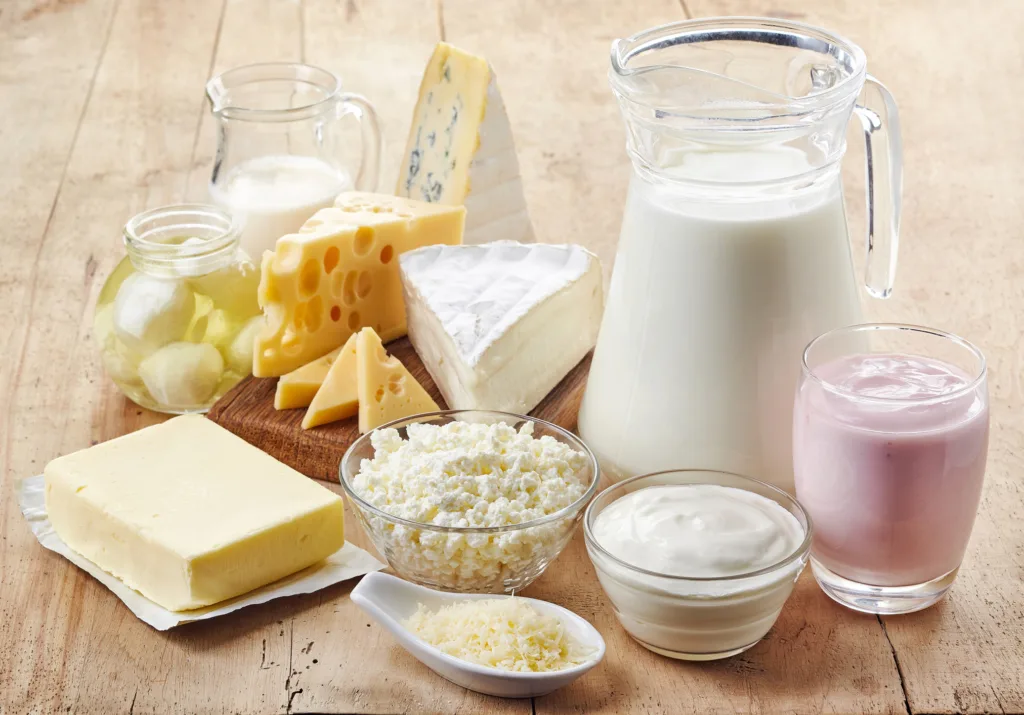
The Great Dairy and Weight Loss Debate
If you Google “dairy and weight loss,” you’ll find mixed messages. Some experts insist dairy is diet dynamite for shedding pounds. Others argue it leads to weight gain. So who’s right?
Truth is, quality research shows dairy’s effects are nuanced. Different factors impact whether dairy promotes weight loss, weight gain, or makes little difference. Let’s review what science says.
Can Dairy Foods Help You Lose Weight?
Some components of dairy may potentially help us lose or better manage our weight. Here’s how:
Calcium: Dairy is by far the richest source of calcium in our diets. Some research suggests calcium may reduce how much fat our bodies absorb. Fat binds to calcium in the digestive tract so we excrete more of it out the other end (sorry for the visual!). But studies are mixed – some show minimal impact. Overall, calcium’s effect on weight loss is likely small.
Protein: Dairy is a high-quality protein source, meaning it contains all the “essential” amino acids our bodies need. Protein keeps us feeling satisfied and full between meals. One study found obese adults lost more weight when they ate yogurt high in dairy protein as part of a reduced-calorie diet. The protein likely helped control their appetites and decrease overall calories.
Probiotics: Fermented dairy foods like yogurt, kefir and aged cheese contain beneficial bacteria called probiotics. Emerging research shows probiotics may positively impact digestion, metabolism, inflammation and other factors tied to weight. But we need more studies on actual weight loss. The European Food Safety Authority agrees yogurt probiotics may “contribute” to weight management – but it’s not a proven fat-burner.
While no miracle food, the protein, calcium and probiotics in low or nonfat dairy may offer modest metabolic and appetite-regulating benefits for some people trying to drop pounds. Next let’s look at the flipside…
Can Dairy Foods Lead to Weight Gain?
On the other hand, science indicates dairy fat in particular can cause us to pack on pounds:
Full-fat dairy: While wholesome and nutritious in some ways, full-fat dairy loads up our diet with extra calories and saturated fat. Observational studies consistently link diets higher in full-fat dairy to slight long-term weight gain – around 0.5 kg per year. Less satiating than protein or carbs, the fat calories may add up over time.
Dairy fat metabolism: Research indicates the particular fatty acids in dairy fat may disrupt our fat metabolism compared to other types. The calcium in dairy fat can create soaps in the gut that partially prevent fat breakdown. So the body may absorb more of those fatty calories.
Appetite stimulation: Another study in Cell Metabolism found the saturated fat in milk stimulated appetite and reward pathways in the brain, motivating people to overeat. So not only is dairy fat highly caloric, it may psychologically spur us to take in more calories.
Overall, science indicates full-fat dairy in particular can potentially contribute to creeping weight gain, especially when consumed in large amounts.
The Bottom Line on Dairy and Weight
Putting together all the evidence, here’s what we can infer:
- Full-fat dairy tends to promote gradual weight gain over time due to its high saturated fat content. Limiting full-fat milk, cheese, yogurt and butter is wise for weight management.
- On the other hand, the protein, nutrients and probiotics in mostly nonfat and low-fat dairy foods may offer small metabolic benefits for weight regulation and loss.
- Dairy fat itself doesn’t seem to “melt” fat away contrary to some marketing claims. But protein-rich, low-calorie dairy foods like Greek yogurt and cottage cheese can be smart choices in a weight loss diet.
So what’s the overall consensus? Dairy fat may tip the scales upwards, but dairy protein and nutrients may complement healthy weight loss for some. Moderation and making leaner choices matters.
Beyond potential effects on our waistlines, dairy has some additional health benefits that can support a healthy weight. Let’s explore those.
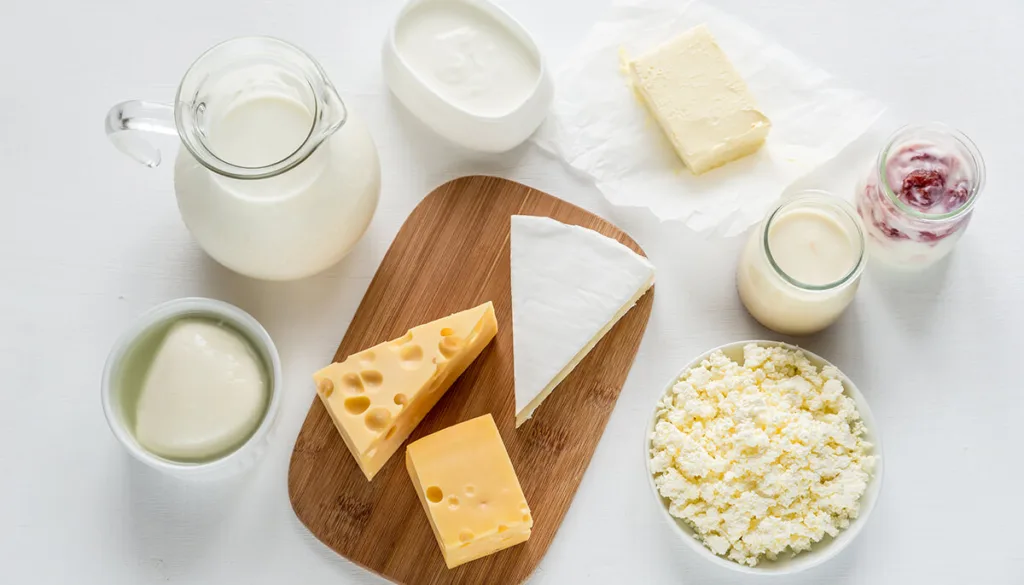
Dairy’s Benefits Beyond Weight
Dairy provides more than just protein and calcium. Consuming dairy foods (especially yogurt and milk) also offers these science-backed health bonuses:
Stronger bones: Dairy really does protect our bones! Observational studies consistently link more dairy intake to higher bone mineral density and strength. Getting enough calcium, vitamin D and other dairy nutrients reduces the risk of osteoporosis and fractures later in life.
Heart health: Despite some contrary beliefs, research indicates dairy fat improves or has neutral effects on cardiovascular disease risk when eaten in moderation. The minerals in dairy play a role in lowering blood pressure.
Type 2 diabetes: Several large studies link yogurt intake to lower T2D risk – likely thanks to dairy protein, calcium and magnesium. Managing diabetes helps weight control in the long-run.
Immunity and gut health: The probiotics and anti-inflammatory nutrients in dairy may benefit our overall immune function and digestive/gut health. A healthy gut is tied to healthy weight regulation and metabolism.
By supporting overall good health, sensible dairy intake can complement an active lifestyle and healthy diet that keeps weight in check. Next let’s talk practical tips.
How to Add Dairy to Your Weight Loss Plan
Alright, time to get actionable! Here are smart strategies for including dairy as part of an overall weight loss diet:
Go low-fat or nonfat: Limit full-fat options and choose skim or 1% milk, low-fat yogurt and reduced-fat cheeses to keep calories down.
Mind your portions: Stick to recommended serving sizes instead of having that whole block of cheese or pint of ice cream. Measuring will keep portions in check.
Pair with other healthy foods: Enjoy yogurt with fresh berries, cottage cheese with avocado, a turkey sandwich with 1 slice of cheese, etc. Shoot for balanced nutrition.
Pick “premium” options: Choose Greek yogurt for extra protein, kefir for probiotics, milk with added vitamin D, cheeses with health halo ingredients like “grass-fed” or “organic”.
Substitute when you can: Trade sour cream for Greek yogurt, use milk instead of heavy cream, top foods with crumbled feta instead of grated cheddar.
Drink milk or kefir: Quench your thirst with dairy beverages instead of juice or sugary shakes and lattes that pile on calories.
And remember, cutting calories through portion control and moving your body are still the foundations for losing weight successfully and sustainably. But dairy can complement your efforts when consumed intentionally.
Busting Myths About Dairy and Weight
Now that we know what science really says, let’s kick some common dairy myths to the curb:
Myth: All dairy leads to weight gain.
Fact: Only full-fat dairy is consistently linked to potential weight gain for most people. Nonfat and low-fat dairy can be part of weight loss.
Myth: Dairy causes inflammation.
Fact: For most individuals, dairy doesn’t trigger widespread inflammation or worsen conditions like arthritis. Some people with sensitivities can get inflamed from it.
Myth: Dairy is bad for your bones.
Fact: This common myth isn’t based in nutrition science. Most studies actually show dairy strengthens bones to help prevent osteoporosis!
Myth: You need dairy for calcium.
Fact: While rich in calcium, dairy isn’t the only source. Greens, soy, canned fish with bones, tofu, seeds and fortified foods also contain this mineral. But dairy remains the most convenient source for most.
By learning the truth behind common dairy myths, you can make informed choices for your health and weight loss diet.
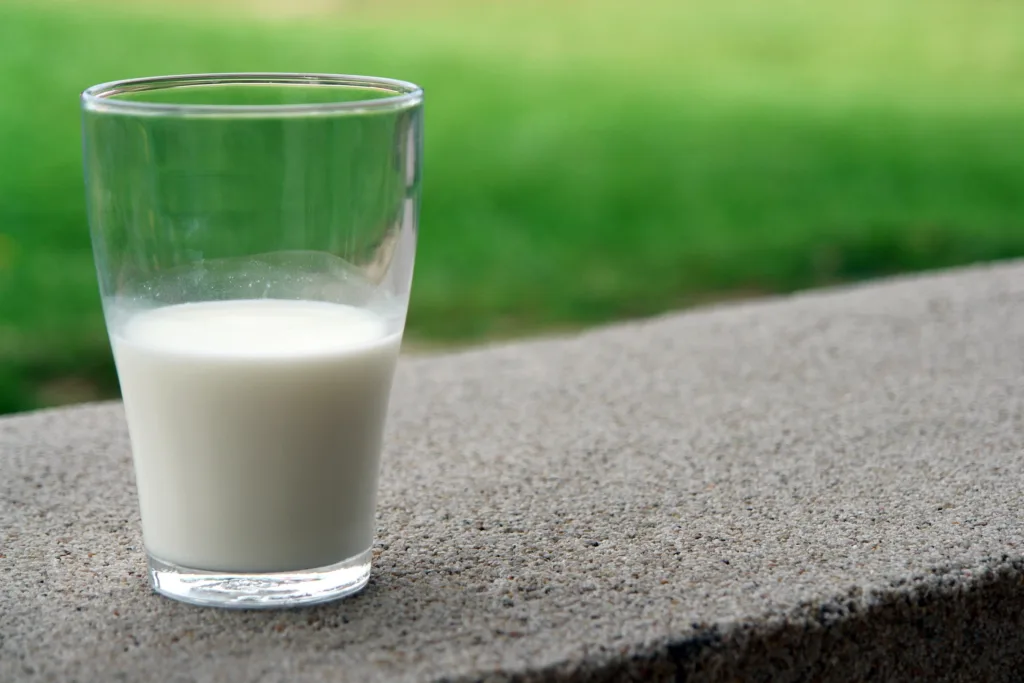
Potential Pitfalls of Dairy to Consider
While nutritious for many, some people do need to watch their dairy intake. Here are factors to keep in mind:
Lactose intolerance: About 65% of adults can’t properly digest the milk sugar lactose, causing unpleasant gas and bloating. Opting for lactose-free milk, hard aged cheeses, yogurt and smaller portions can prevent problems.
Milk allergy: Dairy is one of the most common food allergens, especially in infants and children. An allergy causes immune reactions with symptoms like hives, breathing issues and tummy troubles. Those with a diagnosed allergy need to avoid dairy completely.
Appetite stimulation: As mentioned earlier, dairy fat may spur overeating behaviors in some individuals. Pay attention to your own appetite cues and limit higher-fat dairy if needed.
Hormones: Dairy contains hormones like estrogen, but research indicates the low levels have negligible effects in humans. Organic options come from cows not treated with hormones for extra assurance.
If you have concerns about including dairy in your diet, discuss them with your doctor or dietitian. They can help determine if dairy is a good fit for YOUR unique health and weight goals.
Wrapping It All Up
Let’s recap what we’ve learned:
- Dairy can be part of a healthy diet and lifestyle that supports maintaining a moderate weight for most people. But it’s no magic bullet for melting off pounds.
- The saturated fat in full-fat dairy may contribute to slight weight gain over time when eaten in large amounts. Opt for low-fat or nonfat milk, yogurt and cheese for fewer calories.
- On the flip side, dairy protein, nutrients like calcium, and probiotics may offer small metabolic advantages for weight regulation and loss.
- Beyond potential effects on weight, dairy provides a range of additional health benefits for our bones, heart, diabetes risk and immunity when consumed in moderation.
The key is being mindful about your choices. Approach dairy as just one part of an overall balanced diet paired with regular exercise. With some smart adjustments, you can likely enjoy moderate amounts of your favorite cheeses, yogurts, and the occasional scoop of ice cream as part of a healthy lifestyle that supports your weight goals.
We hope this comprehensive look at the science was helpful! Want more nutrition and weight loss tips? Sign up for our newsletter using the form below. And let us know in the comments – will dairy be joining YOU on your weight loss journey?
Thank you for reading this post, don't forget to subscribe to our free newsletter
!
